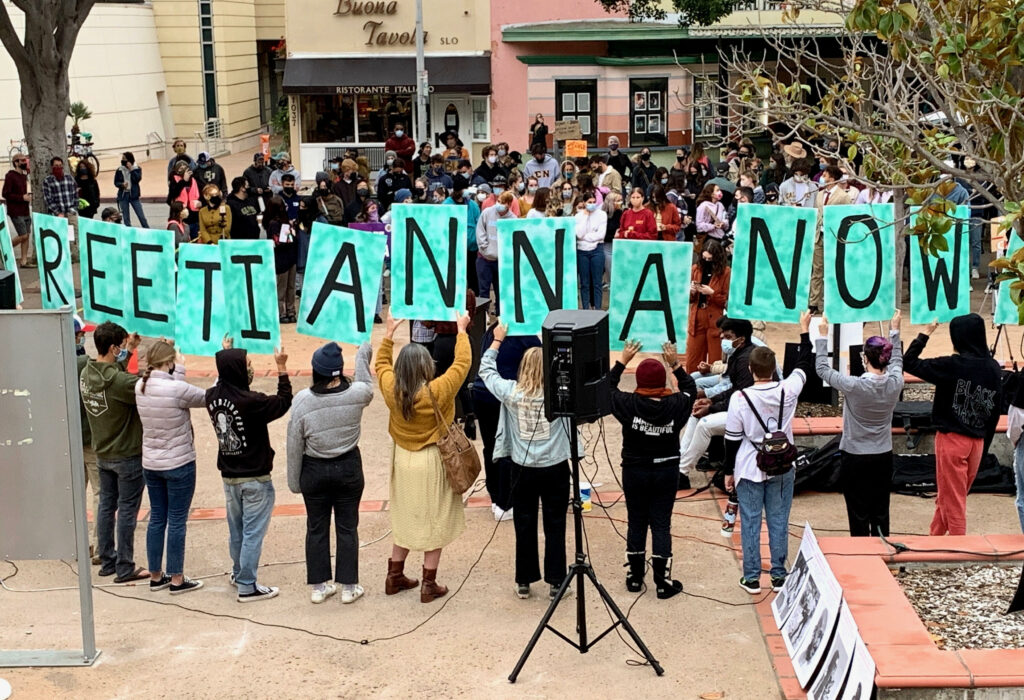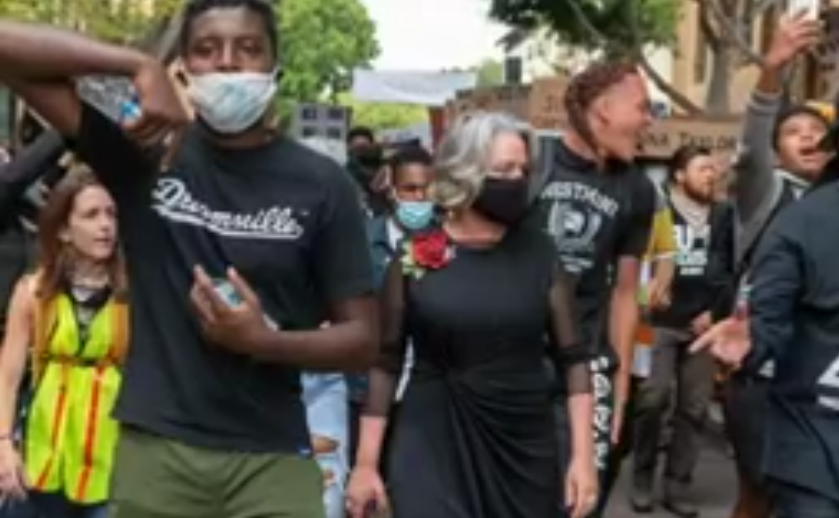Arata wants a SLO County judge to rule on systemic racism
December 7, 2020

Photo by Richard Bastian
By KAREN VELIE
In the latest attempt to have charges against Black Lives Matter protester Tianna Arata dropped without a trial in San Luis Obispo County, her attorneys filed a motion asking the court to determine if systemic racism exists.
In their motions, Arata’s attorneys Patrick Fisher and Curtis Briggs argue that law enforcement officers targeted Arata because she is black and that prosecutors have demonstrated a racially discriminatory application of the law. They have filed motions to dismiss, for a gag order, to disqualify the district attorney’s office and a motion for discovery.
“The charges against Ms. Arata illustrate systemic racism and arise from a pattern and practice of SLO law enforcement targeting black people for prosecution under the law in a racially biased and disproportionate manner,” according to Fisher and Briggs’ motion.
“Further, although the defense does not concede that it is beyond the scope of a demurrer hearing to address whether systemic racism exists, a hearing in regard to this motion is exactly where systemic racism in the application of the law in San Luis Obispo will begin be ferreted out and become dispositive,” according to a motion by Fisher and Briggs.
The SLO County District Attorney’s Office opposed the motion to dismiss because “it is beyond the scope of this hearing to address whether there is or is not systemic racism, and where it resides or to what extent.”
Arata’s attorneys also question why the arrests were not proportionate to race, and that because most of the protesters were white, most of the arrestees should also be white.
In their opposition, prosecutors note that it is ironic that Fisher and Briggs demand proportionality in charges against protesters based on their race while accusing officers and prosecutors of racism because of perceived disproportionality.
“First, the law, and moral conviction demand that we do not consider perceived race of a suspect in the filing of charges,” prosecutors wrote. “Second, to achieve proportionality in charging, we would have to violate the law and engage in just the sort of invidious discrimination that the defendant accuses us of.”
Arata is currently facing 13 misdemeanor charges related to a July 21 protest, when she led approximately 300 protesters onto Highway 101, blocking all lanes in both directions for nearly an hour. While marching through SLO, Arata detained motorists, chased cars attempting to drive away, and hit a car with a stick.
Prosecutors charged Arata with one count of unlawful assembly, one count of disturbing the peace, six counts of obstruction of a thoroughfare and five counts of false imprisonment.
A month after charges were filed against Arata, on Oct. 15, prosecutors filed charges against three additional suspects related to Arata’s alleged criminal activity. Within hours of the filing, the Tribune reported on the arrests of “three black men.”
On Oct. 16, prosecutors filed charges against three white men for crimes they committed during the July 21 march that were unrelated to Arata’s alleged criminal acts, and a separate case.
On Oct. 17, San Luis Obispo Mayor Heidi Harmon accused the county’s top prosecutor of voter suppression based on her belief SLO County District Attorney Dan Dow filed charges against one of the black protesters, not because he violated the law, but because he supported her campaign, in an open letter to Dow.

Heidi Harmon marching in a Black Lives Matter protest
In her letter, Harmon accuses Dow of singling out “three black men—leaders in our communities—from the mostly white crowd,” while failing to mention the three white men who were charged 26 hours later. Harmon also does not mention her participation and promotion of the Black Lives Matter protests alongside Arata.
As evidence of the alleged discrimination, Fisher and Briggs claim prosecutors only filed charges against the three white men because of pressure from the mayor and the Tribune, also failing to mention Harmon’s letter was posted a day after the three white men were charged.
“The District Attorney then failed to charge a single white protestor until the media and mayor pointed how glaringly discriminatory the lack of charges was,” Fisher and Briggs wrote in their motion. “Only after this backlash did the District Attorney announce he would also be filing charges against some white protestors. This illustrates a racially discriminatory application of the law.”
There have been multiple charges filed against people during Black Lives Matter protests in SLO, the majority of whom are white, according to prosecutors.
Following a march on June 1 in which bottles were thrown at officers, seven protesters were cited and five were charged, all of whom appear white, according to court records.
On three separate dates, prosecutors charged eight people involved in the July 21 march — four white and four black protesters.
On Sept. 2, a motorcycle turning left from Los Osos Street into a lane on Higuera Street, where protesters were standing outside the crosswalk blocking traffic, struck a protester who suffered minor injuries. Two black protesters were cited for obstructing traffic and the white motorcyclist was charged with reckless driving.
“Counsel for defendant Arata asserts in his moving paper, ‘The failure to charge a single white protester until pressured by the media and a letter from the mayor illustrates a racially discriminatory application of the law,’ ” according to prosecutors. “The defendant’s allegation is factually false and without merit.”
In his opposition, Dow accuses Fisher and Briggs of making claims of prosecutorial misconduct without any evidence, and that false and baseless allegations of misconduct violate the California Business and Professional Code 6068(d) and Rule 5-200 of the Rules of Professional Conduct.
At a Dec. 10 hearing, Arata’s attorneys plan to seek a ruling on the existence of systemic racism in local law enforcement and the district attorney’s office.






The comments below represent the opinion of the writer and do not represent the views or policies of CalCoastNews.com. Please address the Policies, events and arguments, not the person. Constructive debate is good; mockery, taunting, and name calling is not. Comment Guidelines